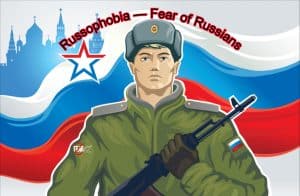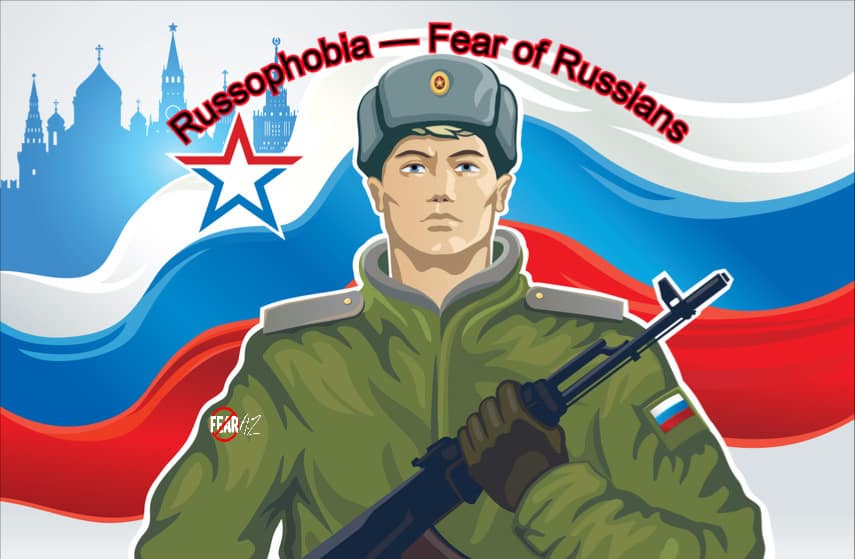Share This Article
Comrade, Let’s Discuss Russophobia
Do you have negative sentiments toward the Russian regime? Does anything related to the political sphere of Russia cause you an incomprehensible fear and sense of dread?
Do you fear Russians or worry that Russian officials might do something aggressive to disturb the sanctity of another country?
Have you also observed the buildup of anxiety and distress within you at the mere mention of Russia? Have you grown to find Russia, its people, its government, and its culture intolerable?
It is likely that you suffer from a fear of Russians. This fear, also known as Russophobia, stems from the Cold War that happened between Russia and the United States and its allies during World War II.
The good news is that it is possible to overcome this fear. Continue reading this article to learn more about this irrational phobia and the steps to deal with it.

What Does Russophobia Mean?
Aversion to or irrational fear of Russia or Russian things is known as Russophobia. A Russophobe is a person who detests Russia or anything related to Russia.
Most of the time, the fear is of the political system that Russia follows or a custom that Russia, previously known as the Soviet Union, observes.
Something as simple as reading an article on Russia in the newspaper may fill a Russophobe with dread. Watching Russian content online or something that is based in Russia on television can also be triggers.
The word Russophobia is a mix of two words: Russo, which means Russia, and phobia, which means fear.
Russophobia Causes
The Cold War occurred between 1947 to 1991. During this time, there was geopolitical tension between the Union of Soviet Socialist Republics (now Russia) and the United States, along with their respective allies. This gave birth to Russophobia.
The critical analysis and reproval of the Russian political system published by various news and media outlets in the Western countries could also be a reason behind an intolerance toward Russians.
Someone who has had a past traumatic experience that involved Russia can grow up to develop Russophobia. This might include being a part of the Cold War or escaping from any war started by Russia that directly affected them and their family.
People with a family history of mental illnesses, anxiety issues, or depression can also be prone to Russophobia.
Sometimes, children are conditioned to develop hatred towards Russia from a very young age. This leads to their developing Russophobia over time.
What Is Russophobia Like?
Russophobia is like any other irrational fear. People become self-conscious and avoid being part of social groups fearing they may encounter someone who might discuss Russian politics.
Most often, with a phobia like Russophobia, which is against a group of a specific category of people, there comes hatred and contempt. Some who suffer from Russophobia resort to hateful rhetoric. Due to this, they may end up at the receiving end of shame and condemnation.
The symptoms of Russophobia such as anxiety, panic attacks, stress, and lack of concentration can adversely affect your routine life as well. You may be unable to finish small tasks without growing uneasy and distracted. The phobia affects you both mentally and physically.
Symptoms of Russophobia
Most symptoms of Russophobia are similar to those of other phobias and fears. Based on the severity of your fear of Russians, your symptoms may vary. Let us have a look at the psychological and physical symptoms that concern Russophobia.
Psychological Symptoms
- Avoidance of Russian people, their culture, and customs
- Lack of concentration and focus
- Escaping from social situations
- Avoidance of newspapers, television, and other sources of information
Physical Symptoms
- Severe anxiety
- Panic attacks
- Breathlessness
- Shivers
- Excessive sweating
- Chills and tremors
Some Ways to Deal with Russophobia
When you are dealing with a phobia, there are a variety of symptoms that may hinder your activities on an everyday basis. To prevent your phobia or your symptoms from getting out of hand, try the following:
- Avoid drinking caffeine-infused beverages that can increase your feelings of anxiety.
- Take up a new hobby, practice mindfulness, eat healthily, and include plenty of exercise in your routine.
- Acknowledge your fears. Try to encounter your source of fear as much as possible. After doing so, work to educate yourself on why the fear is irrational. This will help to ease it.
- Learn breathing exercises that you can implement when feeling anxious or are at a loss of breath.
- Don’t shy away from seeking professional help as and when required.
Russophobia Treatment
If you want to reduce the symptoms associated with Russophobia, administering timely treatment is the best course. The quicker you seek treatment for your phobia, the easier it will be to get over your fears before they become too intense.
Therapists may treat the fear through different methods such as cognitive behavioral therapy, exposure therapy, or mindfulness-based stress reduction.
Cognitive Behavioral Therapy
Through cognitive behavioral therapy, your therapist will target the source of your fears. They will delve into the root cause of your phobia and help you gain comfort in discussing the reasons that led to it. Once you are able to identify the source of your fear, you will be able to counteract and control those sources from getting the better of you.
Exposure Therapy
Exposure therapy helps desensitize people to their fears. The therapist slowly and gradually exposes the patients to the source of their fear over a series of sessions. This treatment option eventually helps the patient feel more comfortable facing their fears. The sessions may progress quickly or slowly, depending on the patient’s convenience and comfort.
Mindfulness-Based Stress Reduction
Stress, anxiety, panic, and overthinking all are prevalent and distinguishable symptoms of Russophobia. Through this form of treatment, a patient will learn a few techniques and methods that can help them tackle their extreme emotions and cope with their symptoms. These treatment sessions usually include multiple meditation courses and teach different skills for dealing with stress and anxiety.
How to Cope with Russophobia?
As mentioned above, it is essential to note that living with Russophobia will come with its fair share of hatred from people who are followers of Russian politics. Such comments can be painful and cause a lot of stress. They can trigger negative emotions and make you question your self-worth too.
The most important part is to educate yourself about Russia, its government, its allies, and any other feature of the country that you fear. Remember to make educated comments on a country or its people. This will help you avoid hurting the sentiments of a group of people based on false narratives.
Discuss your fears and concerns with informed people who can help you get through your fears without passing judgment.
Final Words
Living with a phobia can be difficult. But living without taking measures to work on the phobia and improve your symptoms is all the more harmful. You are responsible for how you feel, and if your fears do not make you feel the best version of yourself, it is time to work towards self-improvement. You will not only feel free of fear, but you’ll also begin to enjoy life more.




